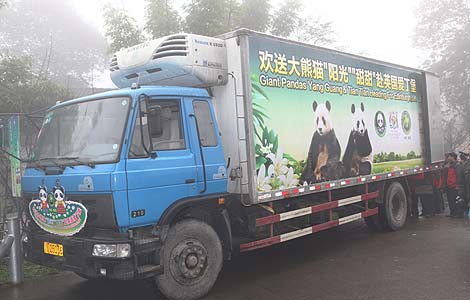Growing demand spurs greater horseplay
Updated: 2011-12-13 08:05
By Shi Jing and He Na (China Daily)
|
|||||||||
 |
|
The China Horse Fair in Shanghai in October attracted 82 exhibitors from 18 countries and regions - and this man and his small horse. [Gao Erqiang / China Daily] |
Too few professionals
"Although the number of imported horses keeps increasing, China's horse industry is still far behind international levels," Yao said. "China has a great shortage of high-level professionals.
"The majority of China's animal husbandry-related universities and colleges do not have horse specialties. And schools that offer veterinary specialties seldom have horses as a subject. There is a big shortage of professional horse veterinarians and trainers."
Wang Jiyu, general manager of Daoxianghu horse club in Beijing, has worked in the horse business for more than 30 years. This is how he described its status:
"On one hand, government and horse club owners spend huge amounts of money to import foreign purebred luxury horses for international equestrian events, some of them costing 1 to 2 million yuan each ($157,000 to $314,000). On the other hand, from veterinary care to feeding, from ranch designs to horse stable management, we all lack systematic professional knowledge.
"No matter how purebred the horse was born, without scientific training, feeding and treating, the horse will lose its high quality soon," Wang said.
Yao noted that some of China's ethnic groups have long histories of horse culture. Instead of learning everything from abroad, he said, we should accept and develop our own heritage to build a complete horse industry that can change current breeding practices that produce only horses of little added value.
"More important, China needs to establish an entire set of modern horse raising and education mechanisms as soon as possible to cultivate more talented professionals in the field. They are vital to the industry's development," he said.
Who's in charge?
"So far, the government has not assigned a single department to specially guide and supervise the horse industry," said Han Guocai, director of the horse research center at China Agricultural University. "On the contrary, departments of agriculture, tourism, culture, sports and even technology all launched their own regulations, which has hindered the pace of development of this emerging industry.
"Take the regulation or operation of horse clubs for instance," Wang said. "Now it is a total mess. Without a clear and binding regulation, China's horse industry cannot develop in a smooth way, let alone form a strong horse industry mechanism to meet the international demand.
"I do hope China's horse industry can be better and be a leader of the industry in the world one day."











